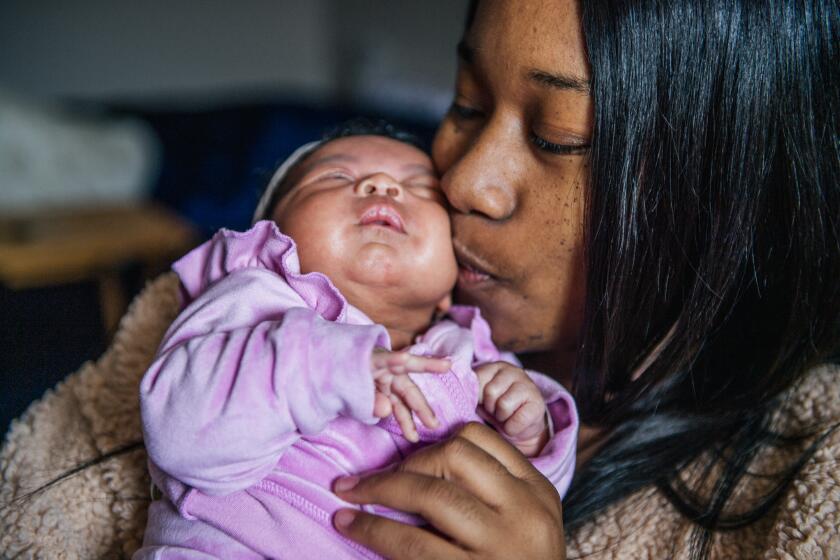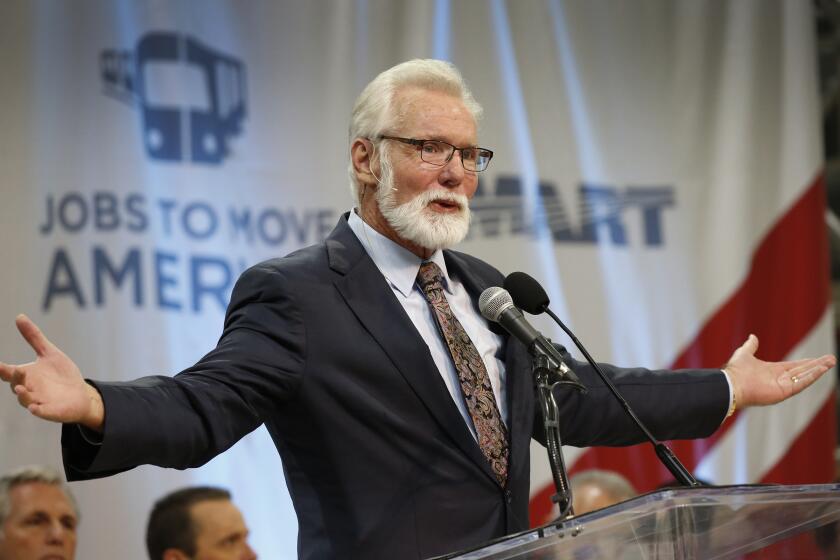California exodus intensifies as retirees, teachers, musicians seek cheaper, less-crowded pastures
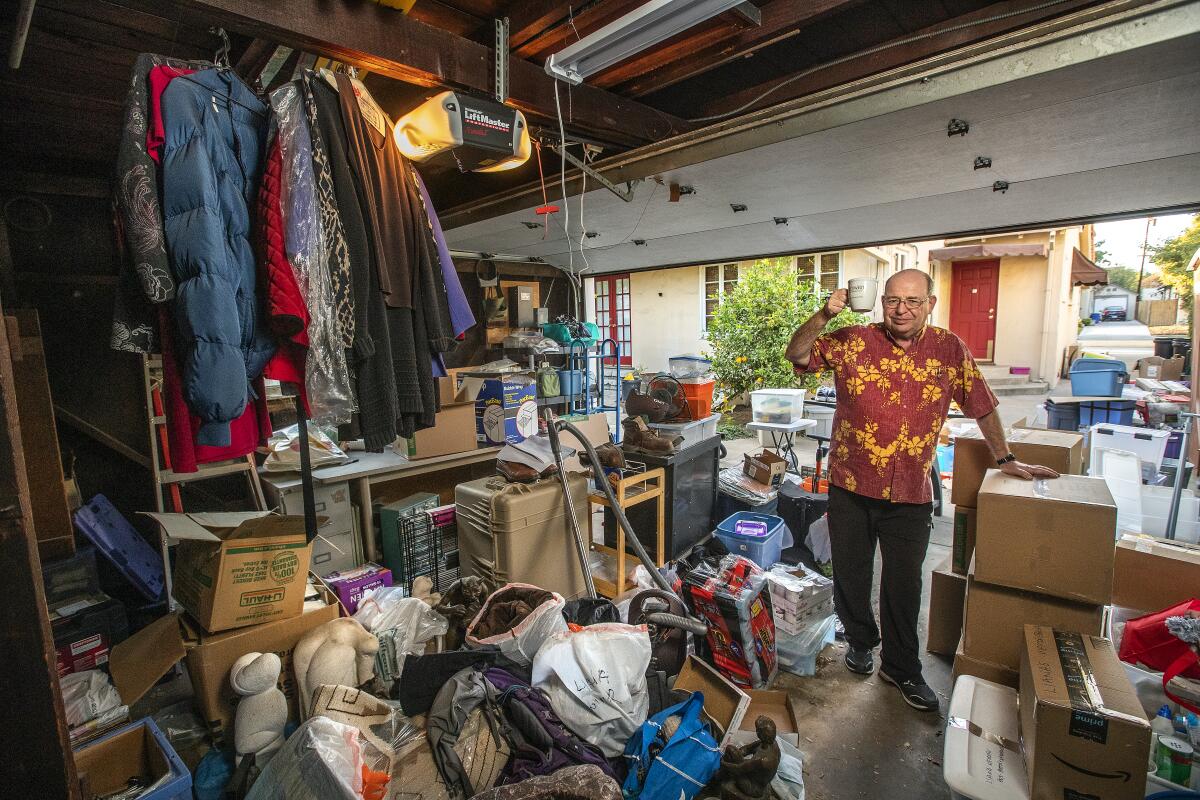
- Share via
The California dream has been fading for a long time, and people have been voting with their feet.
In the last few years, the exodus has accelerated, with tens of thousands more people leaving than moving in.
The COVID-19 pandemic has prompted even more people to give up on the state, experts say. Some have retreated to their hometowns elsewhere because they lost their livelihoods. Others are taking advantage of working remotely to escape the state’s high housing prices and long commutes.
In the fiscal year that ended in July, Los Angeles County had by far the greatest net loss due to migration of any California county — more than 74,000 people, according to state demographers. Some moved to nearby areas with lower costs of living; others ventured farther or left the state altogether.
Sign up for Essential California
The most important California stories and recommendations in your inbox every morning.
You may occasionally receive promotional content from the Los Angeles Times.
California’s beachy lifestyle and creative energy in entertainment, the arts and technology still exert a strong pull — but increasingly, only the wealthy can afford these perks. Dowell Myers, an expert on demographic change and a professor at USC’s Sol Price School of Public Policy, said there is not enough affordable housing to keep young families in the state. Native Californians often stay for personal reasons, but for those who came from somewhere else, there’s little keeping them from heading to cheaper, less-crowded pastures.
“Those who migrated earlier are turning around and going back to where they came from because they just couldn’t achieve the American dream in California — because that involves buying a single-family house,” Myers said.
California saw a net gain of only 21,200 residents in the year that ended July 1, a paltry 0.05% growth rate not seen since 1900, a new report reveals.
Here are the stories of six people who left L.A. in 2020: a teacher, a retired aerospace engineer, a cellist, a pair of filmmaker-musicians and a voice actress.
Each had a complicated personal mix of reasons for moving to a new state, including romantic relationships and a clash with California’s liberal politics. But there were common threads, including an ability to work remotely and a desire for more open space at a cheaper price.
The pandemic was not the sole factor for anyone. Rather, it was a final push to move on from lives in L.A. that had run their course — or, in some cases, had not flowered.
::
Wilber Rubio was already growing tired of L.A. — the crowds, the traffic. His Long Beach house in a decade-old development felt generic.
Then came the pandemic. His job as a special-education math support teacher at a charter school went online. He missed the in-person interaction with his students.
It was not safe to go to Paris during summer break, as he had planned. Instead, Rubio; his partner, Scott; and their three kids piled into an RV to see Scott’s extended family in Arkansas.
They liked it so much they decided to stay.
“I felt like I could breathe again,” said Rubio, 35. “It was the first time I felt at home.”
Rubio has lived all over the world, growing up in the Salvadoran countryside before fleeing the violence there for New York’s Long Island. The Army took him to Virginia, Iraq and Kuwait. Back in New York, he met Scott.
In 2012, they moved to L.A. for Scott’s job at an equity firm and fell in love with the beaches, the culture and the diverse cuisine. But the negatives were wearing on them.
Rubio liked the small-town feel and open landscape of Arkansas — and students there were attending school in person. He found a job as a special-education math support teacher at Bentonville West High School and moved in September to start the school year. Scott is working remotely and plans to commute occasionally to L.A. if his office eventually requires it.
Their kids — ages 11, 13 and 15 — have quickly made friends, with classes and sports proceeding in person despite the pandemic.
They love their house on 1½ acres of wooded land, with a squeaky staircase, stonework on the exterior and twice as much square footage as they had in Long Beach, for roughly the same monthly mortgage payment of $3,000.
People in Arkansas, a state that voted overwhelmingly for President Trump, have been surprisingly open-minded about a gay couple with children, Rubio said.
“I’m a gay, brown man. I didn’t think I would feel this way in a red state,” he said. “I’ve been through a lot of social justice circles, and to be living in an area where you are still accepted regardless of your politics or identity has been refreshing. They do accept me, and they don’t care.”
The best part of his new life in Arkansas is the respect people show for teachers, he said, whether it’s discounts from local stores or students addressing him as “Sir.”
::
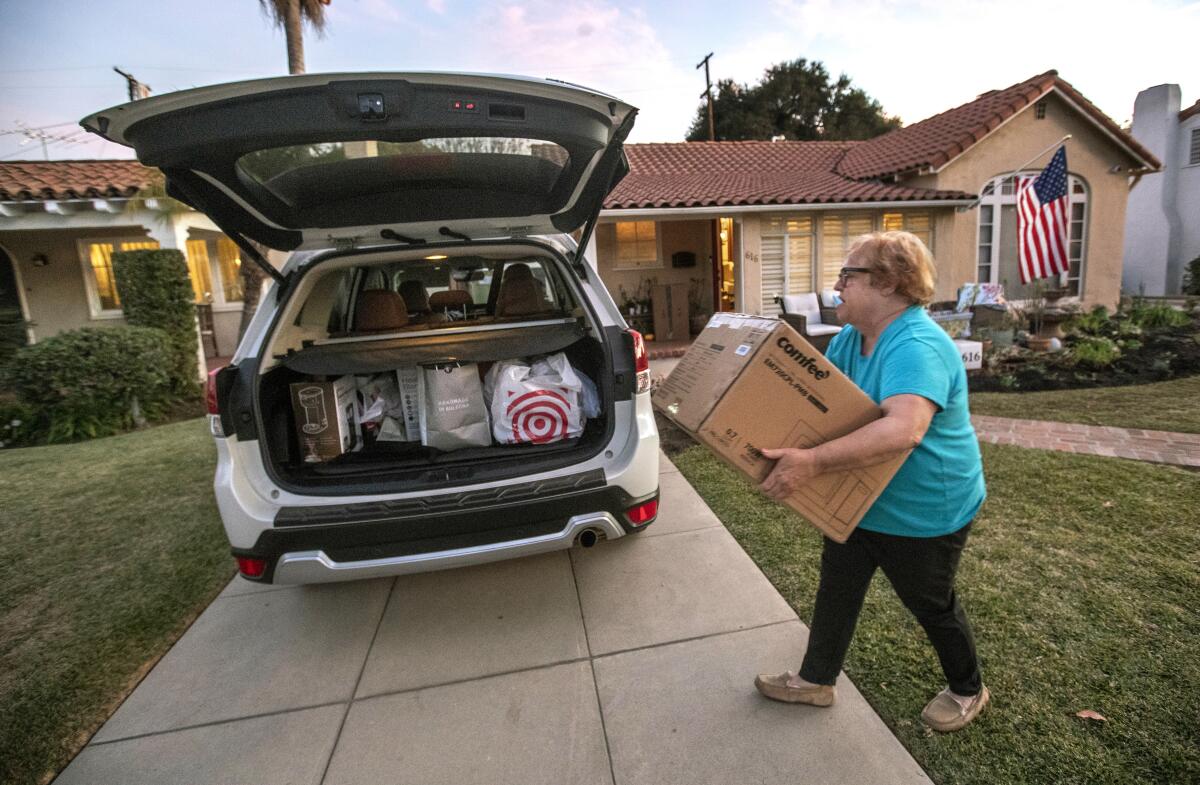
Andrew Kindler stood in his backyard, bubble-wrapping 35mm slides from his PhD research at UC Berkeley in the 1970s.
In mid-December, after more than 30 years in a 1,333-square-foot Spanish-style house in San Marino, he and his wife, Jo Anne, were getting ready to move on. The house, which they bought as a fixer-upper for $197,000, was worth more than $1 million.
For roughly the same price, they had found a place in Scottsdale, Ariz., also Spanish-style, that was three times bigger and recently renovated, with a pool.
Kindler, 68, is retired after a career as an aerospace engineer. Jo Anne has retired from Pacific Bell. He is originally from New York City; she from Chicago. Their daughter was in graduate school at NYU. Nothing was tying them to L.A. If they bought a bigger home in Southern California, their property taxes would shoot up.
And there were politics. Kindler, a Democrat in his youth, evolved into conservatism after graduate school. He was concerned about the increasingly progressive bent of Southern California, the rise in violent crime and the election of George Gascón as L.A. County District Attorney on promises to radically remake the criminal justice system.
“I don’t see the quality of life improving, but prices will rise,” Kindler said. “I feel like this state doesn’t care about me.”
::
Tina Guo, a 35-year-old cellist, moved to Las Vegas in March, just before coronavirus restrictions kicked in and the L.A. music industry ground to a halt. The same factors that allowed her to relocate — the feasibility of recording remotely and her reputation in the industry — have allowed her to make a living during the pandemic.
Guo used to tour the world, spending only about four months of the year in her Studio City condo.
While her live gigs are now suspended, she records in her Las Vegas home and sends the output to L.A. for use in soundtracks to films such as “Wonder Woman 1984” and the upcoming “Dune” and “Top Gun: Maverick.”
Prior to the pandemic, she had perfected her home studio setup, which includes a special “clean” room, screen dividers, a keyboard, microphones with vocal guards, mixing devices and seven cellos.
Guo, who was born in China, grew up in Poway, Calif., and studied classical cello at USC.
When she was establishing herself in the film industry, she needed to be in L.A. in case an in-person studio gig opened up. Now, as a crossover artist known for her rock-star persona, the work comes to her.
“In the last couple of years, I felt more comfortable, in that all of my clients are working with me to work with me specifically, and not just a cellist in general,” Guo said. “So I thought, ‘I don’t really need to be here.’”
She once battled traffic for three hours to get to the airport from Studio City. She was tired of the high taxes and the worn look of older buildings in L.A. So she set her sights on Vegas, where she had performed with a Cirque du Soleil show and at many corporate events.
“It’s super-clean, mostly because all the homes are pretty new compared to L.A.,” she said. “There’s a lot more space, less people and less traffic. … The airport is only 12 minutes from my place.”
For L.A. gigs, she will hop on a 45-minute flight or brave the four-hour drive.
Her condo in a gated community is three times the size of her Studio City place and cheaper: She pays $2,500 a month in Vegas while renting out her old place for $3,600.
“I felt like it was the perfect middle ground,” Guo said.
::
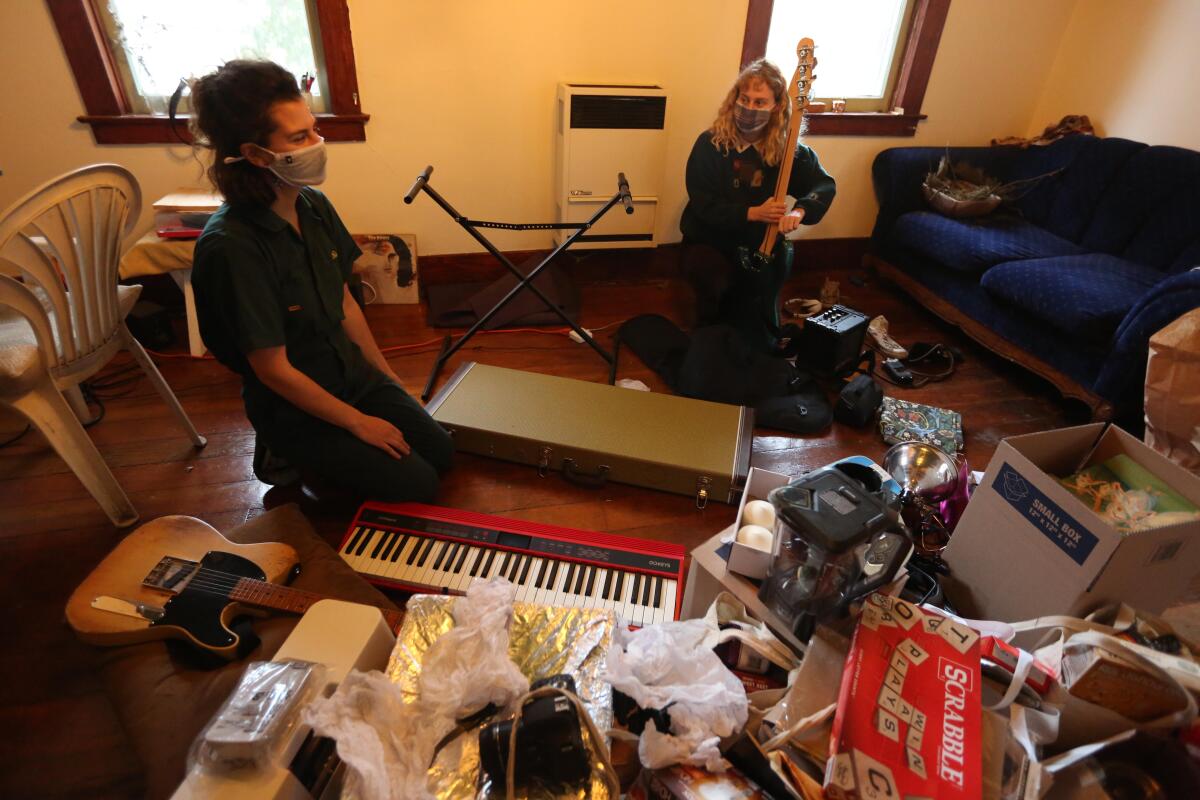
Like many young people before them, Georgina Hahn and Veronica Lorenzini arrived in L.A. hoping to find a community of creative people and a niche for their films and music.
But in March, a week after they left New York and moved into their basement apartment in Echo Park, the city shut down.
With in-person socializing largely forbidden, it was hard to make friends. With the music scene shut down, there were no shows to attend and no gigs to book for their band, Socialist Witch Pop.
Both applied for unemployment, but their work had been mostly under the table, so they received nothing.
Hahn, 24, picked up freelance work doing audio engineering and composing music for podcasts; she also babysat and worked for a bakery. Lorenzini, also 24, found work as a graphic designer. The two are not romantically involved but consider each other life partners.
They had planned to stay for at least three years. But one day in mid-December, they were packing their belongings while humming along to the Blah Blah Blah song “Goodbye L.A.”
Goodbye, L.A. Did you ever notice I was gone? ... I’m going home.
The next day, they hit the road in their blue Toyota Prius, headed to Santa Fe, N.M., drawn by the city’s reputation as an artists’ retreat.
Hahn plans to continue her audio engineering work and has lined up a job writing newsletters about the arts. Their rent is cheaper — $1,650 a month, compared with $2,200 in L.A. — so it will be easier to make ends meet.
In L.A., they felt like they were on the outside looking in. And they did not like everything they saw: homeless people living in front of designer stores, the “heteronormative” vibe of some neighborhoods, the emphasis on image.
“It’s like we’ve arrived, but we’ve never been here,” Lorenzini said. “We’re just ghosts, looking at the city from afar.”
::
Heather Halley’s father moved to L.A. from Kansas in the 1960s when he got a job in Walt Disney’s contract department.
Halley was born in Ventura County and grew up enjoying perks at Disneyland, including passes from her father that bumped her to the front of the lines.
She became a voice actress, work that has for the most part continued through the pandemic, since she was already doing it remotely.
With no need to be in L.A., Halley is moving to North Carolina this month to join her boyfriend.
She regrets not being able to visit Disneyland, which has mostly been closed during the pandemic, before she leaves. She considers the amusement park her second home, and it reminds her of her father, who died in 1995.
“I have mixed emotions about leaving, but I think it’s time for a change,” she said.
More to Read
Sign up for Essential California
The most important California stories and recommendations in your inbox every morning.
You may occasionally receive promotional content from the Los Angeles Times.
